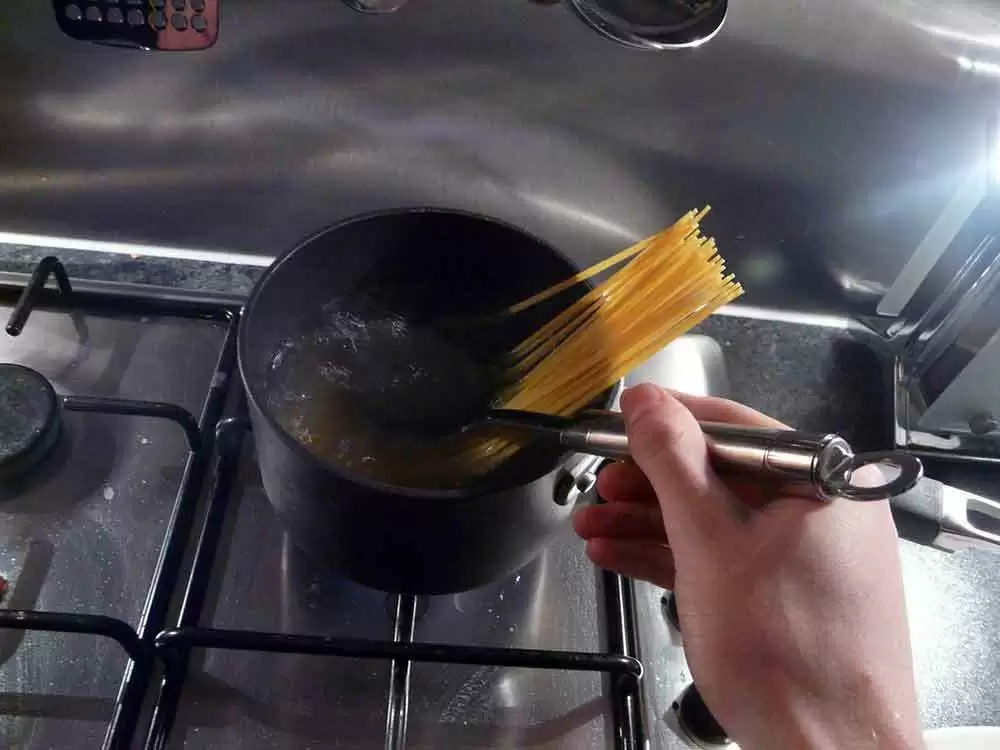
Celiac.com 12/13/2019 - I wanted to add some new revelations I've had about cross contamination, including how not to go crazy worrying about it, and what I believe to be the number one way to prevent getting sick from it.
There are a lot of posts on Facebook in the Celiac Groups about cross-contamination—let's talk about what it is and why it's bad for those with celiac disease.
Cross-contamination is Our Worst Enemy
Celiac.com Sponsor (A12):
For someone with celiac disease, cross-contamination is our worst enemy. We all know that we can't have gluten—no bread, pasta, etc. We all know that even the slightest amount of gluten can hurt us.
Studies have shown that 1/64th of a piece of bread has enough gluten to cause autoimmune problems in celiacs. The FDA has set 20 parts per million (ppm) as the maximum threshold for gluten in something labelled gluten-free. It isn't much.
Let's use an example to describe what is happening. I'm going to use a very simple example because it's, well simple. The kids like peanut butter and jelly sandwiches, chips, and an apple for their lunch. You pull out the bread, swipe the peanut butter and jelly on, and put it in their lunch box. Put the chips into a smaller container, open the fridge, pull out an apple, and call it a day.
Here's the issue—if you put the bread for the sandwich on a plate, awesome, except the plate must now be cleaned before you can use it for any gluten-free items. The knife you used to swipe the peanut butter and jelly across the bread likely has crumbs embedded in the remaining peanut butter and/or jelly. Then if you stuck the knife back into the peanut butter and/or jelly they are also likely contaminated and should be used by those with celiac disease. You likely have introduced crumbs into the containers that you cannot get out.
Next are the chips—you thought you were safe there—wrong!! If you didn't wash your hands and I'm pretty sure you didn't, you may have also introduced crumbs into the chip bag. If the bag is contaminated with crumbs it is now unsafe for celiacs. Also, did you wash your hands before touching the fridge door? You get my drift.
All of this can be controlled if we are careful. But most people don't think about any of this unless they have a food allergy or a family member who has one.
You might think this is a little extreme. It might be. But would you say the same thing for someone with an anaphylactic reaction to peanuts? Or tree nuts? Or anything for that matter? But food is a problem for people with celiac disease and such things can be a serious issue for them.
Many times celiac reactions aren't immediately obvious but they do come. Sometimes the reactions are even violent—explosive diarrhea or vomiting. They might be more subtle like brain fog, extreme fatigue, or joint aches or any of the other 300+ symptoms associated with celiac disease. Not to mention the longer term damage to the villi in the small intestine which can take 6 to 12 months to repair themselves. With ongoing long term damage they may never recover.
Then, really long term there is anemia, malnutrition, and potentially cancer. So continued gluten ingestion, even in small amounts, may have the potential over time to cause cancer in those with celiac disease.
Other hotbeds of cross-contamination are: toasters, butter dishes, scratched non-stick pans, wooden cutting boards and utensils, shared fryers, waffle irons, stirring the gluten pasta then putting the spoon in the sauce, gluten pasta water, non-squeeze bottle condiments, kitchens, etc.
Bottom line—If it has gluten and you touch it, you must wash your hands or the item before it is safe for a celiac.
Cross-contamination is Everywhere
Cross-contamination is everywhere unless you are really careful. Most people don't understand it but I'm hoping this gave you a good introduction into where cross-contamination starts and why it is bad.
Each time you leave the house, someone that has recently touched gluten will have touched something you are currently touching or are about to touch—door knobs, buttons on the card machines, grocery store carts, seats, computer keyboards, everything. All of it. Washing hands with soap and water before cooking or preparing food is the number one way to prevent this from causing an issue.
A recent study suggested that using a common toaster, cooking gluten-free pasta in pasta water previously used to cook pasta, or using a knife that was previously used to cut a cake may not pose a significant risk of gluten contamination. Each scenario tested to below 20ppm for gluten. I'm not 100% sure I'm on board with this study, but it does make me a little less worried about cross-contamination. I would say, however, if you can avoid the such scenarios, do so just to be on the safe side.
There are a couple of other scenarios I see talked about often—non-stick pans, separate plates for gluten and gluten-free food, kissing someone that has recently consumed gluten, or simply having prepackaged gluten foods next to pre-packaged gluten-free foods.
The non-stick pans and separate plates issue—if you can replace the non-stick pans, great. If not, hand wash and then run the pans and dishes through the dishwasher and they should be safe.
Kissing someone who recently consumed gluten, I think you are okay on this one, too, especially if they have a glass of water or other gluten-free beverage before engaging in a lip lock! As a side note, I would not let this disease get in the way of a passionate kiss, EVER! But that's just my bias.
If a package of gluten-free food is in a sealed container and the seal is not broken, the food in the package is still gluten-free.
I saw a recent post about a college student wanting to take Lysol wipes into class to wipe down desks before she sat down for fear that someone before her might have been eating a gluten snack at the same desk. My answer was first, are you going to be eating off the desk? Second, are you going to be able to wash your hands before the next meal? If the answer to the first question is yes, then yes, take wipes and wipe everything down. But why the heck are you eating directly off a desk in a strange place and maybe you need to rethink your eating habits. If the answer to the second question is yes, then no you don't need wipes. A good hand washing should be sufficient to protect you from any incidental cross-contamination picked up in the outside world.
We Have to Live in a World That is Covered in Gluten
Cross-contamination is a serious issue in the celiac community that has to be monitored and minimized. At the same time, we cannot let the disease or fear of cross-contamination rule our lives. We cannot be afraid to go out or to do anything for fear of getting sick. There must be a balance. My balance may look different from your balance, but we have to find a way to get to a place where we feel comfortable living our lives without being in constant fear. What I might see as acceptable risk, someone else may not, and that is fine. My whole point is that you have to find a way to be comfortable and not make your life feel like you are living in a gluten-free jail.
Balance and the ability to live a full gluten-free life with few restrictions is the entire point of my blog—in addition to providing information about celiac drugs, new studies and talking about celiac disease.








Recommended Comments
Create an account or sign in to comment
You need to be a member in order to leave a comment
Create an account
Sign up for a new account in our community. It's easy!
Register a new accountSign in
Already have an account? Sign in here.
Sign In Now